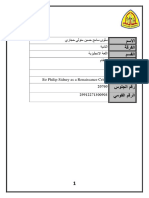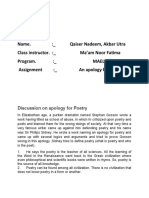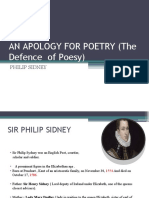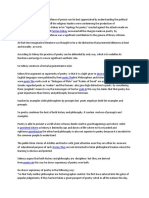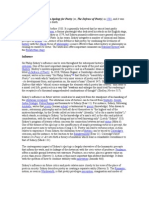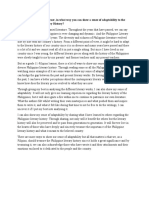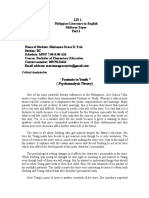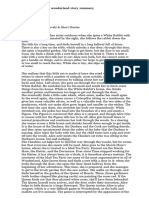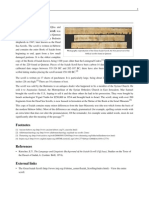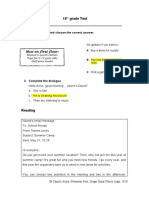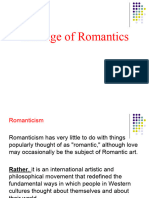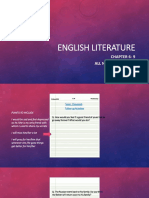Provide detailed explanation of Sir Philip Sidney’s critical ideas from *An Apology for Poetry*
An Apology for Poetry (1595) was written in clear, straightforward language. Sidney was a key
figure in the Elizabethan era, and his work defends poetry (which includes all imaginative
literature, like stories, plays, and poems) as a powerful and valuable art form. Below, I’ll break
down his main ideas with detailed explanations for each point, keeping the language easy to
understand.
---
### 1. Poetry Is Better Than Philosophy and History
Sidney argues that poetry is more effective than philosophy (which studies ideas and truth) and
history (which studies real events) because it combines the best parts of both while avoiding
their weaknesses. Poetry teaches lessons and is enjoyable, making it a better tool for inspiring
people to be good.
- **Poetry vs. Philosophy**: Philosophy teaches moral lessons through abstract ideas, like rules
about how to be a good person. But it’s often boring and hard to understand for most people.
Poetry, on the other hand, wraps these lessons in exciting stories or beautiful language. For
example, a fable like “The Tortoise and the Hare” teaches patience and hard work in a way that’s
fun and easy to remember, unlike a dense philosophy book.
- **Poetry vs. History**: History tells true stories about what happened, but these stories don’t
always teach good lessons. Sometimes historical events are messy or show bad behavior
without clear morals. Poetry, however, can make up stories that show perfect examples of
courage or kindness. Sidney says history is stuck with the “brazen” (imperfect) real world, while
poetry creates a “golden” (ideal) world. For instance, a made-up hero like King Arthur can inspire
people to be brave more than a real historical figure whose actions might be flawed.
- **Why Poetry Wins**: Poetry’s strength is its ability to both teach and entertain. By creating
ideal characters and situations, it motivates people to act virtuously. Sidney believes poetry
speaks to both the mind and the heart, making it more powerful than philosophy’s logic or
history’s facts.
�---
### 2. Poetry’s Moral Purpose
Sidney says poetry’s main job is to teach people to be better and make them enjoy the process.
He defends poetry against critics, like Puritans, who thought it was sinful or useless, by showing
how it encourages good behavior.
- **Teaching and Delighting**: Poetry doesn’t just lecture; it makes learning fun. By telling
engaging stories or using beautiful words, poetry makes moral lessons stick. For example, a
poem about a heroic knight might inspire someone to be brave and honorable because they
admire the character.
- **Imitation (Mimesis)**: Sidney borrows from the Greek philosopher Aristotle, who said poetry
imitates life. But Sidney goes further, saying poets don’t just copy the real world—they improve it.
They create perfect versions of people and events that show how things *should* be, not just
how they are. For example, a poet might write about a flawless leader to show what true
leadership looks like.
- **Inspiring Action**: Poetry stirs emotions and imagination, pushing readers to act virtuously.
Sidney points to ancient stories, like those of Achilles in *The Iliad*, which make readers want to
be strong and noble. He believes poetry can guide people toward moral perfection.
---
### 3. Defending Poetry Against Critics
In Sidney’s time, some people, especially Puritans like Stephen Gosson, attacked poetry, calling it
�lies, immoral, or a waste of time. Sidney responds to each criticism to prove poetry’s worth.
- **Poetry Isn’t a Lie**: Critics said poetry is deceitful because it’s made-up. Sidney disagrees,
saying poets don’t pretend their stories are true facts. Instead, they create fictional worlds that
teach deeper truths about life and morality. He says, “The poet never lies because he never
claims to tell the truth.” Unlike historians, who might get facts wrong, poets focus on universal
ideas, like courage or love.
- **Poetry Isn’t Immoral**: Some claimed poetry encouraged bad behavior, like romantic poems
leading to lust. Sidney says the problem lies with bad poets, not poetry itself. When done right,
poetry promotes good values, like honesty or bravery, and condemns bad ones, like greed or
cruelty.
- **Poetry Isn’t Frivolous**: Critics called poetry a silly pastime. Sidney argues it’s a noble art that
lifts the mind and soul. He points out that ancient cultures, like the Greeks and Romans,
respected poets as wise teachers, almost like prophets, showing poetry’s deep cultural value.
---
### 4. The Poet’s Special Role
Sidney sees poets as powerful creators, almost like gods, who use their imagination to make
new worlds. He gives poets a high status because of their unique abilities.
- **Divine Inspiration**: Sidney believes poets are inspired by a divine spark, giving them the
power to create something beyond the ordinary world. He calls them “vates” (a Latin word for
prophets or seers), suggesting their work is almost holy.
- **Poets as Teachers**: Poets guide society by showing ideal examples of behavior. Through
their stories, they teach people how to be better, unlike philosophers who use complex
arguments or historians who stick to real events.
�- **Creative Freedom**: Unlike other fields, poets aren’t limited by rules or reality. They can
imagine anything, from epic battles to perfect heroes, allowing them to inspire in ways other
disciplines can’t.
---
### 5. Problems with English Poetry
While Sidney loves poetry, he thinks English poetry in his time needs improvement. He offers
constructive criticism to make it better.
- **Lack of Skill**: Sidney says many English poets don’t follow the polished techniques of
ancient Greek and Roman poetry, like proper rhyme or structure. He wants English poets to study
classical forms, like epics or tragedies, to raise their work’s quality.
- **Too Much Decoration**: Some poets use overly fancy words or complicated language that
hides the poem’s meaning. Sidney urges poets to focus on clear, meaningful writing that serves a
moral purpose.
- **Hope for the Future**: Despite his critiques, Sidney is optimistic. He praises early English
poets like Geoffrey Chaucer and his contemporary Edmund Spenser, believing English poetry can
become as great as classical works. His own poetry, like *Astrophil and Stella*, shows his effort
to improve English verse.
---
### 6. The Power of Imagination
Sidney emphasizes that poetry’s strength comes from the imagination, which lets poets create
�worlds better than reality.
- **Creating Ideal Worlds**: Poetry’s “golden world” shows life as it could be, with perfect heroes
and moral lessons. This inspires readers to strive for a better life. For example, a poem about a
just king might encourage real leaders to act fairly.
- **Universal Truths**: Unlike history, which focuses on specific events, poetry deals with ideas
that apply to everyone, everywhere. A story like *The Odyssey* resonates across centuries
because it explores timeless themes like courage and homecoming.
---
### 7. Influences from Classical and Renaissance Ideas
Sidney’s ideas build on older thinkers, blending their wisdom with his own.
- **Aristotle**: Sidney uses Aristotle’s idea of mimesis (imitation) but says poets don’t just copy
life—they make it better. While Aristotle focused on tragedy, Sidney applies this to all poetry.
- **Horace**: The Roman poet Horace said poetry should teach or delight. Sidney says it does
both, making it uniquely powerful.
- **Italian Renaissance**: Sidney was inspired by Italian scholars like Scaliger, who saw poetry as
a way to teach virtue and wisdom. This fits with the Renaissance goal of using art to improve
humanity.
---
�### 8. Sidney’s Historical Context
Sidney wrote during the Elizabethan era, a time of cultural growth and religious debate, which
shaped his ideas.
- **Humanism**: As a Renaissance humanist, Sidney believed literature could educate and uplift
people. His defense of poetry supports the idea that art can make society better.
- **Elizabethan Literature**: English writing was just starting to shine with figures like Spenser
and Shakespeare. Sidney’s work helped prove poetry was a serious and valuable art.
- **Protestant Values**: As a Protestant, Sidney saw poetry as a way to promote moral behavior,
aligning with the era’s focus on personal improvement, while countering Puritan attacks on art.
---
### 9. Sidney’s Lasting Impact
Sidney’s *Apology* influenced how people thought about literature for centuries.
- **Later Critics**: Writers like John Dryden and Samuel Johnson built on Sidney’s ideas about
poetry’s moral and artistic value.
- **Boosting English Literature**: By defending poetry and pushing for better writing, Sidney
helped pave the way for England’s literary golden age in the late 1500s and 1600s.
- **Modern Relevance**: Sidney’s ideas about poetry’s ability to inspire and teach still matter
today. His “golden world” concept connects to modern debates about how literature shapes
�culture and ethics.
---
### Conclusion
In *An Apology for Poetry*, Sidney passionately defends poetry as a vital art that teaches,
delights, and inspires. He argues it’s better than philosophy or history, creates ideal worlds to
guide moral behavior, and counters critics who call it useless or sinful. By emphasizing the poet’s
creative power and the role of imagination, Sidney elevates poetry as a tool for improving
humanity. His critiques of English poetry show his hope for its future, and his ideas, rooted in
classical and Renaissance thought, remain influential today.













